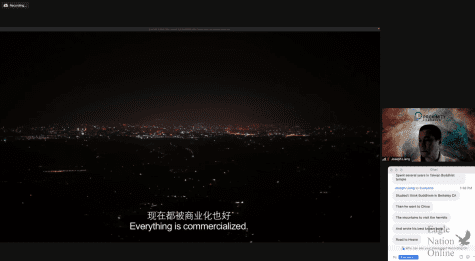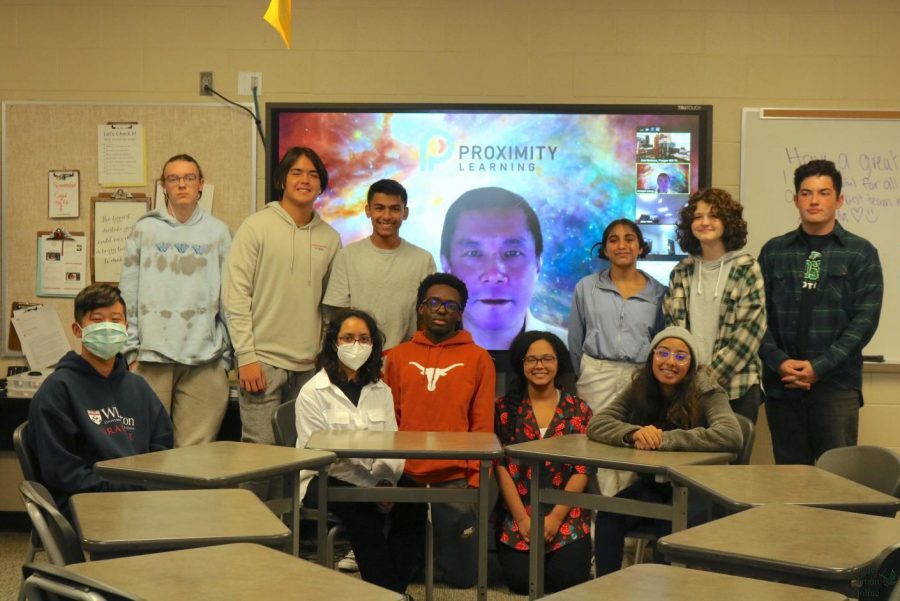Mandarin teacher explores language, Chinese culture through virtual platform
Joseph Liang shares online teaching journey, importance of culture in foreign language instruction
Standing in front of Mandarin teacher Joseph Liang in a Zoom call, a few of his seventh-period Mandarin students gather for an after- class photo. Liang teaches virtually with Proximity Learning from Chicago on Zoom. “The class being virtual hasn’t really impacted me much. It sort of reminds me of doing virtual work during COVID, just with all the students in one room,” sophomore Steevi Kidd said. “I like the online classes better than in-person, as well.” Students pictured here are these: Chris Oh, Rhett Gerritsen, Jeshua Shultz, Luis Cruz, Kritika Kotha, Joseph Muthami, Joseph Liang, Steevi Kidd, Hamail Wan, Nada Gadd, Sage Ericksen and Jake Hart.
When most students are presented with ways to fulfill their foreign language requirement, Spanish or French are the first to come to mind — but not for the students in Mandarin teacher Joseph Liang’s virtual classroom.
Liang is a Mandarin and Physics teacher with Proximity Learning in Chicago, and he connects with classrooms in Texas and Louisana through Zoom. In the Prosper Independent School District, Liang teaches Mandarin I and Mandarin II virtually to both Rock Hill and Prosper.
What I learned is that the culture in China is very strict. There is a system of class, so the rich can easily get treated and the poor have a harder time to find jobs, and even buy simple things like food, clothes and a living space. Also, when China had been overpopulated, the government dealt with it, saying that every family could have one child. If a mother had two, the government would force an abortion, get fined and lose their job. If a family had a boy, they would keep it, and if it was a girl, then they would give her up for adoption. So, there is a decrease in women, and a major increase in men in China, which makes it harder to get married.
— Nada Gad, Sophomore
“I’ve always liked computers,” Liang said. “I just feel that teaching online, you have much more stuff I can use on the screen to show and to pipe in music and sound effects, that in regular in-person classes it would be harder to manage that.”
Liang has been teaching online since 2011.
“Online is ideal for teaching foreign language,” Liang said. “I can immerse you right now, just purely speaking in one language, and gesture until you understand.”
Virtual learning also allows for Liang to assign listening assignments, providing accurate forms of student evaluation at a lower cost than an in-person Language Lab.
“In-person, when I evaluate you constantly, it’s not conducive of instruction. I can only put down an impressionistic grade after a month,” Liang said. “These (Language Lab) recordings are native speaker recordings, and highly structured in terms of vocabulary. Language Lab has a specific goal that you have to use these talks. I learned English this way when I was in China, but that was a long time ago. Those were vinyl records that you could put on headphones and play. There were questions and answers, and they would come along with a lot of other learning materials.”
Liang came to the United States on a full scholarship for his studies in 1998.
“I was a brave young man,” Liang said. “I was 25-years-old and moved here by myself. Afterward, because of the political turmoil and the Tiananmen Square movement — the crushing of students — I never returned.”
Liang said he believes students enjoy learning Mandarin more when they know the culture and practical usage of the language.
“I always like the cultural parts because the kids have more fun, so they have more interest,” Liang said. “It’s like a science, you know? If you don’t have any background, like, ‘What is this for?’ like particular elements. If I tell them that those elements are very important in our daily lives, such as light bulbs or television screens, and then they make connections and will be more interested. Otherwise, memorizing the periodic table is kind of boring and dry.”

Freshman Steevi Kidd, a student in Liang’s seventh-period Mandarin class, said that she took Mandarin because she was “most interested” in learning the language.
“Other than the language portion, I’ve learned a lot more about Chinese culture than I knew previously,” Kidd said. “What I enjoy most about Mr. Liang is that he plays a lot of videos that help us better understand the culture, and also gives us time in class to complete our Mandarin work.”
Another student in Liang’s seventh-period class — Joseph Muthami — said he took Mandarin because he wants to learn Japanese.
I’ve learned that China had a much richer history than I thought. The most I’ve enjoyed about the class is the movies and funny things (Mr.) Liang tells us.
— Christopher Oh, Freshman
“I found myself picking Mandarin because of the linguistic similarities between Chinese and Japanese, with both speech and calligraphy,” Muthami said. “Mr. Liang ensures we know about China as a people, culture and its history just as much as we do its language. He’s constantly giving in-depth details on historical events and documentaries we watch in class so that we fully understand the event’s effect on Chinese society.”
In his Mandarin classes, Liang heavily incorporates cultural elements and current events into his language instruction through films and videos. While he said he includes culture in his instructions to interest students in the language, he also said he wants to give them a “competitive edge” as institutions around the country continue to open up internationally.
“I think it’s key for Americans to learn geography and culture of different nations, especially if you teach a language. Otherwise, we have very little chance to learn these things,” Liang said. “I think it’s the task of teachers, of the education system, to truly bring different cultures and languages (into the classroom,) so students can be more exposed.”
Your donation will support the student journalists of Prosper High School. Your contribution will allow us to purchase equipment and cover our annual website hosting costs.

Honors & Awards:
2 Best of SNO publications
Dallas Morning News National High School Competition 1st place
Quill and Scroll National High School News Competition 2nd place
Quill and Scroll Honor Society Member
2020 TAJE Fall Fiesta: Superior Portrait, Honorable Mention News-Feature Photo
2021 TAJE Fall Fiesta: Excellent Sports Reaction, Honorable Mention Feature Photo
Interscholastic League Press Conference 2021 individual achievement awards:
Top in Texas: Feature photo
2nd: Photo Slideshow
3rd: Portrait
Honorable Mention: News Feature











